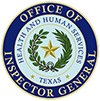Avoiding Common Pharmacy Violations
In its work to investigate and prevent fraud, waste and abuse in Medicaid and CHIP services delivery, the Texas Health and Human Services Office of Inspector General (OIG) conducts investigations, audits and inspections related to pharmacy providers. These actions help providers minimize billing mistakes and ensure Texas tax dollars are used for their intended purposes.
Working with an array of pharmacies across the state gives the OIG a unique vantage point for identifying problematic areas that are easily avoidable but frequently overlooked. The OIG team compiled the following list of commonly identified issues.
Refill problems are among the most frequently identified errors. These issues usually involve dispensing refills when they weren’t prescribed. The OIG often observes:
- Unauthorized refills.
- Billing for more refills than prescribed.
- Billing refills as initial fills.
Record keeping is another common area for improvement. Providers must have evidence that their billing matches their actions, which match the prescriber’s orders. Those records — including complete and signed prescriptions, medication invoices and delivery confirmations — are essential to ensuring clients receive the appropriate amount, duration and scope of Medicaid-funded services. Investigators often see:
- Missing or incomplete records to support billed services (including transferred prescriptions), missing medication invoices, unsigned prescriptions, and lack of delivery confirmations.
- Incorrect medication quantities or strengths.
- Prescriber identification number and dispensing label errors.
Billing and dispensing. Another common issue is when pharmacies bill for more of a medication than they can show they purchased. That’s a red flag. At a minimum, it shows a lack of attention to Medicaid record-keeping requirements, but at worst, it can indicate intentional fraud by billing for something never actually dispensed.
Other errors include dispensing incorrect quantities or strengths and errors on the medication labels. These errors can have big implications for patient care. Additional issues observed involve:
- Billing for a brand name but dispensing a generic medication impacts the reimbursement rate and can be a warning sign of deliberate fraudulent activity.
- Inaccurate National Drug Codes (NDCs) hinder the OIG’s ability to verify the medication dispensed is the same as the medication billed and the same as medications purchased by the pharmacy. Pharmacies must bill the NDC that corresponds with the medication dispensed.
Telephonic and electronic prescriptions
On phoned-in prescriptions, sometimes the records collected from the prescriber and reviewed against pharmacy prescriptions show those prescriptions were never actually called in. Electronic prescriptions often show additional medications or refills added that were not originally prescribed. If there are changes discussed with the prescriber, make sure you get written confirmation to avoid these issues.
Costly violations
Whether intentional or accidental, errors can add up to a significant and costly problem for a pharmacy. The following cases were settled in fiscal year 2023 by the OIG.
An OIG investigation showed that over a four-year period, a pharmacy in Edinburg billed for medications that were not supported by purchase records. The OIG worked with the provider to resolve the case and agreed to a settlement of $130,000.
A similar investigation revealed a McAllen pharmacy's inventory and purchase records did not support the quantities of medications it billed to Medicaid over a four-year period. The pharmacy’s contracts and vendor drug program policy require a pharmacy to maintain records of all National Drug Code purchases. The OIG agreed to a $56,302 settlement.
Report a problem
Providers who discover their own discrepancies are encouraged to self-disclose the matter to their pharmacy benefits manager, managed care organization or to the OIG’s Fraud Hotline at 800-436-6184 or website, ReportTexasFraud.com. The OIG may consider self-disclosing as a potential mitigating factor that warrants less restrictive administrative action or sanction.

